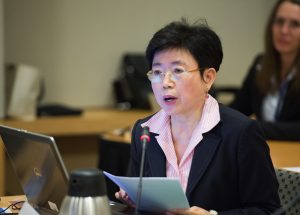Debt and Human Rights Crises in the Era of COVID-19 Pandemic and Policy Options

Yuefen Li, UN Independent Expert on Debt and Human Rights
The COVID-19 pandemic and the lockdown to contain the spread of the virus have wreaked havoc to both the supply and demand sides of the economies in the world resulting in sharp economic contraction and social dislocation. Therefore, a health crisis has also triggered a debt crisis, a human rights crisis and economic and social crisis. The hardest hit are the developing countries which have weak health and sanitation system, narrow fiscal space and are dependent on tourism, remittances and commodity exports. However, many developing countries had entered the pandemic with unprecedented debt burdens. Thus, while effective pandemic response requires a massive amount of government expenditure, they have accrued less revenue while having to divert the much needed financial resources to service debt. To save lives and livelihood or to service debt is a real and urgent challenge for them.
Human Rights Analysis
The issue of debt has, traditionally, been considered as a matter pertaining to financial and economic studies, overlooking human rights as a central element of the analysis. Nevertheless, the current crisis clearly demonstrates how much debt issues are closely linked with the realization of human rights, exposing the connection between debt, available resources and the fulfilment of human rights obligations.
The pandemic has, yet again, clearly underscored that the progressive and full realization of economic, social and cultural rights should not be perceived as a mere ideal. The implementation of the rights to housing and food, as well as the rights to health, water and sanitation, through the establishment of universal services and comprehensive social protection systems for all, have an essential role to play to cushion the dire impacts of crises on human rights and the economy, in particular for the most vulnerable and marginalized. The pandemic has shown that human rights must be included in the economic equation.
As a priority, to flatten the infection curve and prepare for an equitable, resilient, greener and sustainable economic and social recovery, debt problems of developing countries have to be addressed as effectively and quickly as possible. As developing countries entered the pandemic with unprecedentedly high debt levels, their debt burden has been an obstacle preventing their Governments from performing their human rights obligations, including with regard to social protection, urgently needed medical services and basic needs.
Fiscal Breathing Space
The IMF and G20 Debt Service Suspension Initiative (DSSI) are welcome but far from sufficient as the amount of relief is limited, the time duration is too short and the coverage of countries is too restrictive. A more comprehensive debt standstill with longer duration should be put in place for countries with heavy debt burdens whom are hard hit by the pandemic and as well as those that have requested debt relief, including middle-income countries and small island developing States, to provide them with fiscal breathing space.
The landscape of developing country debt has been changing in the composition of debt instruments, creditors and debtors. As a result, debtor countries with access to international capital markets would desire to reduce debt burden while maintaining market access. Debt buyback and debt swaps could be among the possible options without causing rating downgrades but if so would need to be handled well to achieve the desired debt relief. However, special financial facilities need to be established as many of these countries are facing a credit crunch. For debt distressed countries, debt standstill is necessary, but no substitute for debt restructuring and debt cancellation. Past experience has shown that it is difficult for insolvent countries to grow out of a debt trap.
Saving Lives and Livelihoods
To save lives and livelihoods, IFIs and development banks, are encouraged to continue providing valuable financial support to developing countries. The request for a fresh allocation of Special Drawing Rights (SDRs) should be considered.
In parallel, efforts should be made to develop a human rights compatible sovereign debt-restructuring framework and not wait for another crisis to rekindle it from ashes.
Private Sector Key Role
The private sector has a key role in efforts to overcome the pandemic and private businesses need to abide by their human rights obligations.[1] Its active participation in debt relief is crucial to ensure the effectiveness of the standstill. Private creditors should follow a time-bound suspension of legal litigation during the pandemic. International cooperation is needed to try to end the pandemic earlier. The longer the pandemic lasts, the heavier the debt burden will be for developing countries. The phenomenon like vaccine nationalism will be disastrous, as no county is safe until every country is safe in a pandemic
[1] UN Guiding Principles on Business and Human Rights endorsed by UN Member States A/HRC/17/4.
